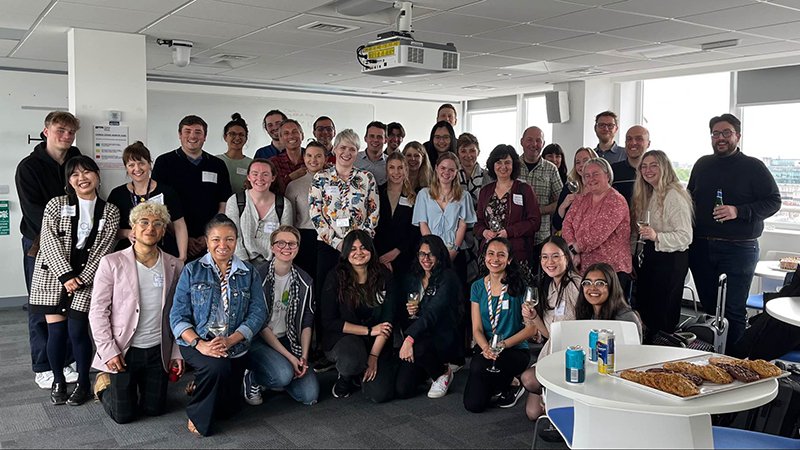The power of student partnerships in digital transformation
Recent events have highlighted the importance of working with students as partners in digital transformation and hearing what they have to say about the impact of changes to how they have been learning.

CAN conference
This year’s CAN conference in May, hosted by UCL (University College London) and supported by Jisc, was a three-day celebration of student partnerships on the theme of sustaining partnerships in transformative times, hearing from students as ‘ChangeMakers’ and staff on how these partnerships are changing institutional practice.
The Change Agents’ Network (CAN), established by Jisc with the University of Greenwich in 2013, supports students working on innovation and curriculum change projects as change agents, digital pioneers, student fellows, champions, researchers and students working in partnership with staff. The network has membership from staff and students across the UK and internationally.

Opening this year’s conference, Derfel Owen, director of change and improvement at UCL, said:
“We have to get to know our students and understand them and their lived experiences. There are opportunities to engage students in every aspect of their education and at UCL we are committed to working with our students as ChangeMakers, reviewers of teaching practice, quality reviewers, on student panels and student representation. Together with our students as partners, we are shaping the future of our university.”
Sarah Knight, Jisc’s head of learning and teaching transformation, higher education and research directorate, said:
“UCL, like many other universities and colleges, has embedded students as partners into the culture of their organisation and this has enabled students to play an active role in the design and development of their digital environment.”
Starting with ten student-led projects, UCL ChangeMakers has grown to support around 90 projects each year and seeded a sister scheme, Student Quality Reviewers, which involves students in named and paid roles on their quality assurance processes.
This episode of Think Ahead TV welcomes staff and students from the Change Agents’ Network to discuss the importance of working together when revolutionising approaches to learning.
So, what did students attending the conference have to say?
“It is really great to see so many innovative student-staff partnership taking place in real education settings! The conference really creates a space for educators to exchange and share their practices and for students to gain confidence in the future partnership projects.” - Trista Wu, UCL student fellow
“The CAN Conference presented the potential that student-staff partnerships have and the necessity to continue reviewing and reforming those partnerships to address the challenges we currently face in higher education. It was amazing to see so many people engaged in creating opportunities for meaningful partnerships.” - Molly Edwards, UCL student fellow
“The CAN Conference provided a great opportunity for educators and students to learn more about the future of student-staff partnerships and enables the student voice to shape this future.” - Stephanie Cunningham , UCL student fellow
Student projects
Several student partnerships were shared at the conference showcasing the positive partnerships in action at universities:
- The Student Technology Mentors (STMs) team at the University of Hertfordshire has worked together to create an engaging online digital skills course.
- Co-creation and staff student partnerships are key drivers of Queen Mary University of London’s 2030 Strategy. They are promoting co-creation and co-chairing in Staff Student Liaison Committees (SSLCs).
- The University of Nottingham has launched a Curriculum Transformation project to redesign and redevelop the way they design and deliver programmes of study and The University of York’s Inclusive-Learning@York team has developed several initiatives in inclusive learning and teaching partnerships.
As one of the UCL ChangeMakers said:
“CAN is all about the student voice: I didn’t know our voices were valued so much and how we can affect change and influence institutional policy – that is the collective power of CAN.”
Student Futures Manifesto
Student partnerships have been central to the recent Student Futures Manifesto, (SFM) initiated by UPP Foundation Student Futures Commission (2021).
Speaking at the CAN conference was independent education expert Mary Curnock Cook. As chair of the commission, she gave an insight into the SFM initiative, set up to ensure successful student futures following the pandemic.
She said their research and engagement shows that, since the pandemic, the majority of students have lost confidence in terms of their learning and mental health, and the SFM aims to address these issues
It provides a blueprint for how universities and students can work together to improve students’ experience of university and give the sector a clearer focus on students’ priorities.
Mary said:
“The sector's absolutely at its best when it gets behind an idea like this and we wanted it to be a very kind of generous and collaborative piece of work. We had fantastic engagement: we had a lot of oral sessions and vice-chancellors all gave us their input; we had over 40 submissions from different universities and student unions …. so, we have lots of material to work with.”
Student Futures Commission
“The commission feels that the pandemic showed the value and necessity of listening to diverse student voices and engaging students at every stage of the student lifecycle as active partners within the institutions. This is about more than the adage of ‘Meeting students where they are at.’ It’s taking the time and initiative to meet students as equal partners in decision-making and co-creating solutions which benefit their future success.”
Connect More
Sarah Knight was also involved in Jisc’s recent Connect More event, where she chaired a panel which brought into focus students’ insights into their current learning environment and the change they have experienced after two years of learning remotely, to being back in the classroom and on campus.
Students from Harlow College, the University of Plymouth and UCL spoke about the benefits of using technology to support their learning, from the ease of access; the ability to fit learning around other commitments of work or caring responsibilities; to the ability to quickly connect with their tutors through online chat. They valued the benefits of being able to revisit recorded lectures to aid with recall, understanding and revision.
Michaela Moclair, Plymouth University said:
“As a student digital champion, I’ve learned how to use technology such as Panopto for recording sessions, as well as Zoom and how to navigate breakout rooms and things like miro boards, which could be useful in the future for presentations and things like career development. All these sorts of technologies could really help me in the future.”
Rebecca Herbert, Harlow College said:
“I did my entire GCSE syllabus online and I find being able to work at your own pace really helped because if you got stuck on something you could easily message your teacher. The fact that you could do it at your own pace meant you understood it more.”
Sarah added:
“Students were also able to share the negative aspects of their experiences of remote learning, including the feeling of isolation, the lack of community and missing the sense of belonging after not having met their year group and feeling disconnected from their college or university.”
This feedback is echoed in the recently published HEPI/Advance HE Student academic experience survey 2022 with a recommendation that “Universities should proactively design programmes that will help build cohesion among students, especially those whose courses have been severely affected by the pandemic.”
However, Sarah reported that the feedback from students was they valued being back on campus and that technology continues to play a significant and positive role in supporting their education. The transferability of the digital skills they have developed over the past two years is seen as a positive to take forward in their future careers.
At CAN, Mary Curnock Cook, summed up the importance of the student partnership approach, saying:
“Students want to be talked to, not talked about.”
Further information
- Subscribe to the CAN mailing list
- Follow the CAN blog
- Read the Journal of Educational Innovation, Partnership and Change
See also: Tackling digital transformation together